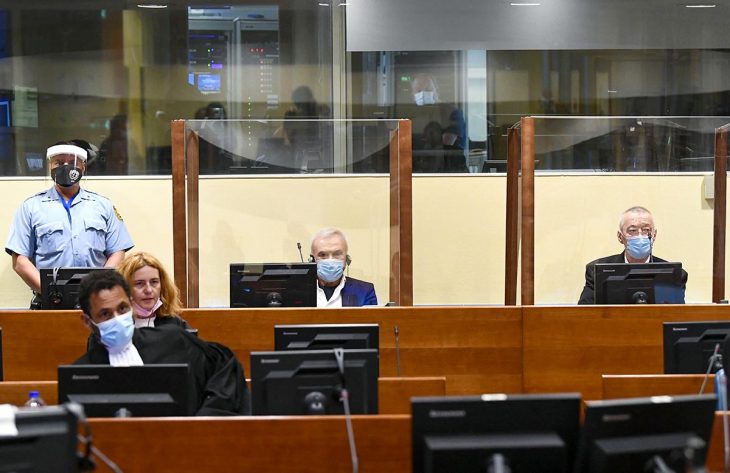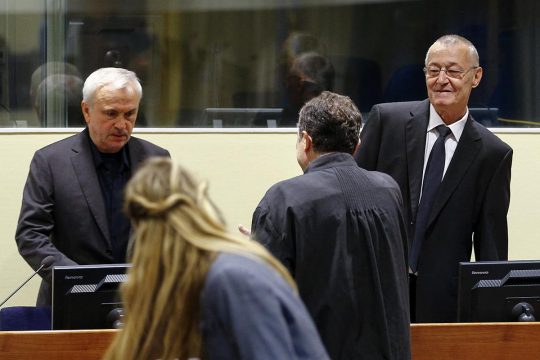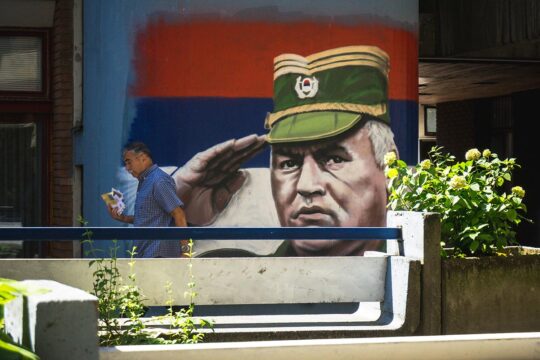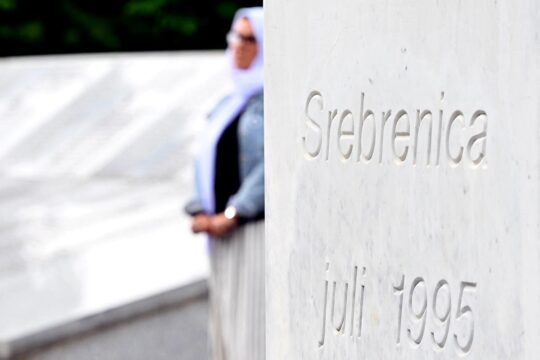In a 45-minute summary of the judgment read out in court, judges sentenced on June 30 former head of Serbian state security Jovica Stanisic and his subordinate Franko ‘Frenki’ Simatovic both to 12 years in jail. They were found guilty on five counts for “aiding and abetting the commission of crimes in Bosanski Samac” in Bosnia. The pair were not held responsible for crimes charged by the prosecutor in four other Bosnian municipalities and several towns and villages in Croatia.
Their conviction marks the first time Serbian state officials have been found guilty of war crimes committed in neighbouring Bosnia during the 1990s conflicts that followed the collapse of Yugoslavia. But judges did not follow the prosecution’s case theory which cast Stanisic and Simatovic as puppet masters pulling the strings of paramilitary units – including some of the most notorious Serb militias operating in Bosnia and Croatia between 1991 and 1995, the Scorpions and the Tigers.
The UN judges did rule that a joint criminal enterprise existed which aimed to drive out the majority of the non-Serb population from Serb-claimed areas of Bosnia and Croatia. More importantly, it found the purpose of the criminal enterprise was “shared by certain senior political, military, and police leadership in Serbia”, and that there was a link between the regime of Serbian president at the time Slobodan Milosevic and ethnic cleansing campaigns on the ground in Bosnia.
Milosevic himself died in a UN cell before judges could hand down a ruling on his alleged role in the 1991-95 war in Croatia, the 1992-95 war in Bosnia and the 1998-99 Kosovo conflict.
“Practical assistance”
However, with regard to Stanisic and Simatovic the judges said it could not be established beyond a reasonable doubt that they were part of that joint criminal enterprise. Judges did not convict them of bankrolling and organizing a variety of paramilitary units operating in Bosnia and Croatia.
In the end the only units to whose crimes they were linked were those committed by the State, known as “Frenki’s men”, “Red Berets” or simply “The Unit”. Members of these units trained a group of 18 men from the city of Bosanski Samac in north eastern Bosnia on the border with Croatia. In 1992, when Serbs took over Bosanski Samac, these men would go on to kill, torture and rape Bosnian Muslims and Bosnian Croats. Judges deemed there was not enough evidence to say Stanisic and Simatovic had authority over them while they committed crimes, but they did find that their “practical assistance” through training these men had a “substantial effect” on the crimes.
A “cynical compromise”
“The trial chamber came up with a decision which leaves absolutely everyone dissatisfied,” said University of Utrecht historian Iva Vukusic, who specializes in Serb paramilitaries during the Balkan wars.
The prosecution said they would carefully read the verdict to see if there were grounds for appeal, especially with regard to the charges the judges did not find proven beyond a reasonable doubt.
Still, prosecutor Serge Brammertz said the convictions were a “step forward” in ensuring accountability for crimes in the former Yugoslavia. “As senior officials in the state security service of the republic of Serbia, Stanisic and Simatovic contributed to the commission of crimes by paramilitary forces and other armed groups in furtherance of ethnic cleansing campaigns against non-Serbs,” he stressed in a statement.
Stanisic’s lawyer Wayne Jordash announced he would appeal and slammed the conviction. “They found one incident in one municipality and the evidence of that was weak,” he told journalists outside the court. “To me it looks like a cynical compromise that we have to find some way to convict him (Stanisic) to justify why they put a man on trial for eighteen years.”
Longest running Yugoslav case
The case against these men is the longest running Yugoslav war crimes trial before UN judges. Stanisic and Simatovic were first charged and arrested in 2003 and went on trial before the International Criminal Tribunal for the former Yugoslavia (ICTY). In 2013, they were acquitted.
The judges ruled that the crimes charged in the indictment did happen. However, they said Stanisic and Simatovic could not be held legally responsible for them because there was no evidence that the orders they issued were “specifically directed” at aiding the commission of the crimes. On appeal in 2015, judges rejected this legal reasoning. Instead of making their own ruling, they ordered a retrial, even though the ICTY was shutting up shop.
The retrial opened before the ICTY’s successor institution, the International Residual Mechanism. It has been going on, with stops and starts, for almost four years. Stanisic and Simatovic were largely absent in court, having been granted provisional release with their attendance waived for most of the proceedings. The pair was in court Wednesday, but if they had any reaction to their conviction it was not visible behind the medical face masks they wore in court as part of anti-coronavirus measures.
They have both spent considerable time in detention -- some five years for Stanisic and eight years for Simatovic. That, coupled with tribunal custom of releasing convicts when they have served two- thirds of their sentence, means Simatovic is expected to be released soon. Stanisic may have to stay in prison another three years, but he was previously released on health grounds and could put in a similar request.
Outsourcing violence
In Wednesday’s verdict the judges only linked Stanisic and Simatovic to their own secret police units but did not find they could be held responsible for crimes committed by other paramilitary groups in Bosnia.
Vukusic said the trial and the conviction highlighted the difficulties of a case based on paramilitaries who are operating across a border and are seemingly independent actors. This is a pattern that is seen in many conflicts today and will likely generate the same problems for prosecutors if those conflicts ever end up before an international court.
“It is actually very difficult to get convictions for crimes when they are tied to units across a border, when there is no de jure chain of command and it’s kind of blurry because they are formally in a different territory,” she said.
According to Vukusic, the tactic was used by Serbia during the 1990s wars. “You create plausible deniability, this idea that you outsource violence to actors that are seemingly independent in order to stay far away from it and say: ‘we have nothing to do with it’,” she explained. “It’s useful for states and as long as they get away with stuff because they outsource this violence, I think states are going to continue doing that,” she added.
The Stanisic and Simatovic judgment was one of the last left over from the wars that tore apart Yugoslavia after the fall of communism, after former Bosnian Serb military chief Ratko Mladic had his life sentence for genocide upheld earlier in June.








